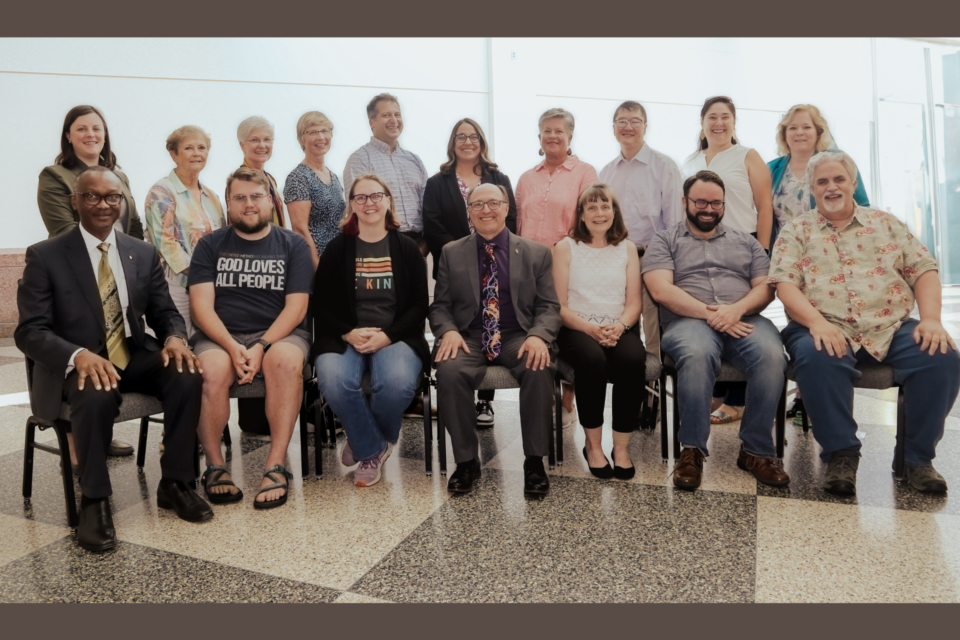The 2024 North Central Jurisdictional Conference concluded on Saturday, and delegates returned home inspired by a church thinking anew and moving forward.
JAMES DEATON
Content Editor
In many ways, the 2024 North Central Jurisdictional (NCJ) Conference, held from July 10-13, was an immediate response to the 2024 General Conference of The United Methodist Church. The repercussions of that historic event in Charlotte, North Carolina, were felt last week as delegates from the 10 annual conferences of the Upper Midwest met in Sioux Falls to assign bishops and cast a vision for the jurisdiction for the next four years.
The United Methodist Church has entered a new season, and glimpses of this new church are emerging. NCJ delegates were asked to start adapting to an environment with tighter resources, look seriously at our church structures and models of leadership and the expectations we place on them, and think creatively about how we might make changes in the future.
The denomination is moving forward, taking steps toward God’s beloved community by continuing to dismantle racism and become an inclusive church, particularly as it relates to our LBGTQIA+ siblings. NCJ delegates also learned more about worldwide regionalization (watch here), which General Conference recently affirmed, and considered next steps for annual conferences.
Here are three takeaways from the 2024 NCJ Conference that Michigan United Methodists should think on and then discuss with others in their congregation.
Takeaway #1: Be bold in your vision and think differently and creatively about leadership in the church.
As the number of bishops within The United Methodist Church decreases and the connectional ministries funded through our general church boards and agencies continue to be impacted by a significantly reduced denominational budget, NCJ delegates were given an opportunity to dream up new solutions.
The NCJ Committee on Episcopacy faced the unprecedented challenge of assigning six bishops to 10 conferences in seven episcopal areas. On Saturday, a creative arrangement was announced. On September 1, 2024, Bishop David Alan Bard and Bishop Kennetha Bigham-Tsai will begin their joint oversight as bishops of the Illinois Great Rivers Conference while continuing to serve as bishops of Michigan and Iowa, respectively.
Both bishops will actively serve the Illinois Great Rivers Conference for the next four years. The balance of duties may shift, but not the shared assignment. Bishop Bard’s focus will likely include finishing up the disaffiliation process for congregations wishing to depart The United Methodist Church, while Bishop Bigham-Tsai will have the opportunity to pave the way for a shared episcopal area with Iowa.
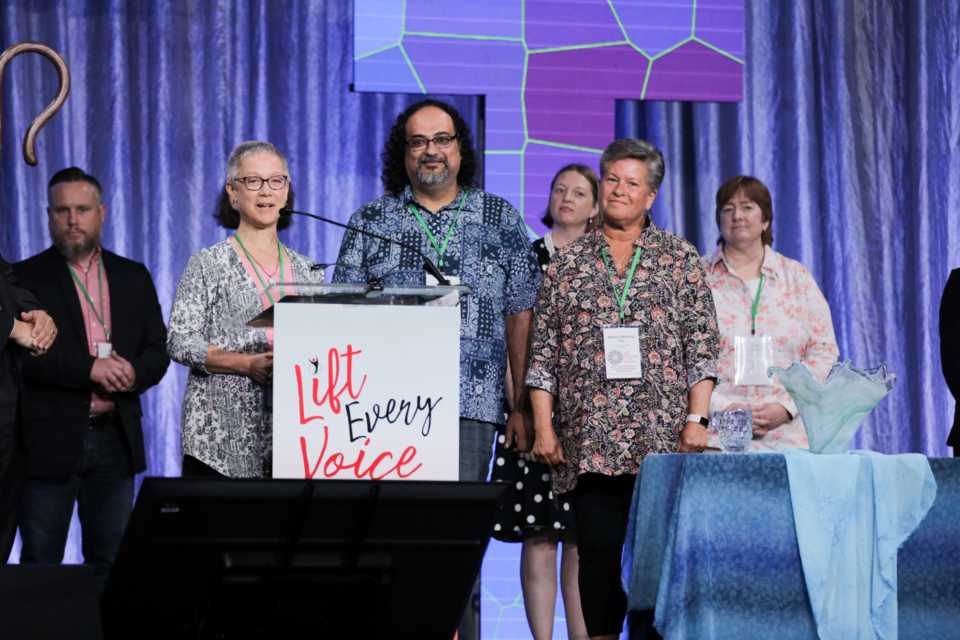
Bishop Bard explains that among the most important roles for a bishop, and one he attends to thoughtfully, prayerfully, and relationally, is helping to create a culture for an annual conference. He has done that for eight years, as the West Michigan and Detroit Conferences became the Michigan Conference and in Minnesota, where he served as interim bishop from 2021-2022. “Bishops,” he says, “help shape the culture of a conference through the relationships they develop, particularly with leaders, through the appointments they make, through their preaching and presiding.”
“This new episcopal arrangement, which creatively extends itineracy,” Bishop Bard adds, “provides us with a unique opportunity to experiment with new ways of providing leadership. This is an adventure in the Holy Spirit, and just as circuit riders went out into new areas, not always certain what they might find, so we are venturing forth into new territory, where we will draw the map as we travel. We go remembering the final words of John Wesley, ‘the best of all is God is with us.’ We travel together in the Illinois Great Rivers Conference trusting that among all our great rivers, we will also discover in new ways the healing and renewing river, the streams of which make glad the city of God.”
Bishop Kennetha Bigham-Tsai, who previously served as a pastor and district superintendent in Michigan, was elected on the first ballot at the 2022 North Central Jurisdictional Conference and then assigned to Iowa. “I bring a strategic mind, a deep passion for equity and justice for all people, and a commitment to building what the Rev. Dr. Martin Luther King, Jr., called the beloved community,” comments Bishop Bigham-Tsai. She also has a passion for leading change to help local churches grow in their vitality and impact and is skilled at “adaptive leadership,” a style of leadership that looks at the systemic and emotional barriers to change.
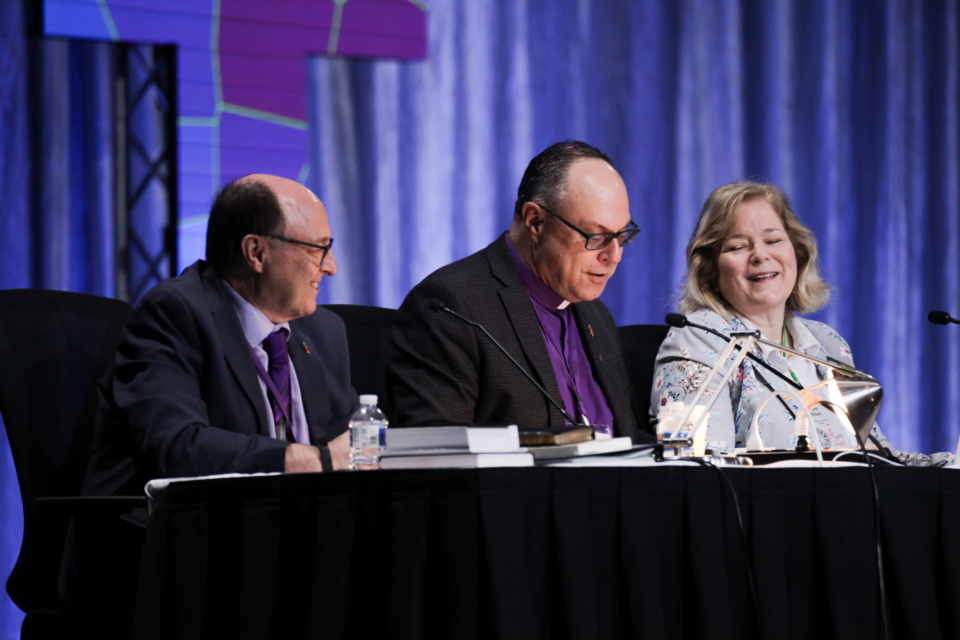
“I am very excited to bring my gifts to the Illinois Great Rivers Conference (IGRC),” she says, “and to work with my colleague Bishop David Bard to help them live into its mission and vision. Bishop Bard and I will build upon the good work already done by Bishop Frank Beard and the clergy and laity of IGRC. I am excited to see what God will do through all of us.”
Laura Witkowski, lay member of Grand Rapids: Aldersgate UMC and co-chair of the Michigan Conference’s NCJ delegation, expresses how this new triad area between the Illinois Great Rivers, Iowa, and Michigan Conferences has “offered us a chance to try something different.”
She continues, “Hopefully, annual conferences, including those of us in Michigan, will be inspired to think differently about our leadership and find creative ways to do ministry despite our shrinking budgets. The Michigan Conference will need to continue to pray for Bishop Bard as he begins serving two annual conferences again. Also, our conference needs to be bold and offer the creative leadership required over the next four years as we return to focusing on our conference vision of ‘equipping and connecting through Christ-centered: Mission & Ministry, Bold & Effective Leaders, and Vibrant Congregations.’”
Takeaway #2: Refocus on our Wesleyan heritage and United Methodist beliefs and let those guide you to ministry in your context.
Returning to our roots is critical in this post-General Conference season as The United Methodist Church focuses on practices and teachings that reinforce identity and formation. Several highlights from the conference illustrate this call to reclaim our core beliefs.
Attendees of the 2024 NCJ Conference received Bishop Rueben Job’s book Three Simple Rules — A Wesleyan Way of Living and then spent time each day reflecting on one of John Wesley’s three simple rules: do no harm, do good, and stay in love with God. During daily devotional times, attendees responded to the rule of the day by interacting with the worship space.
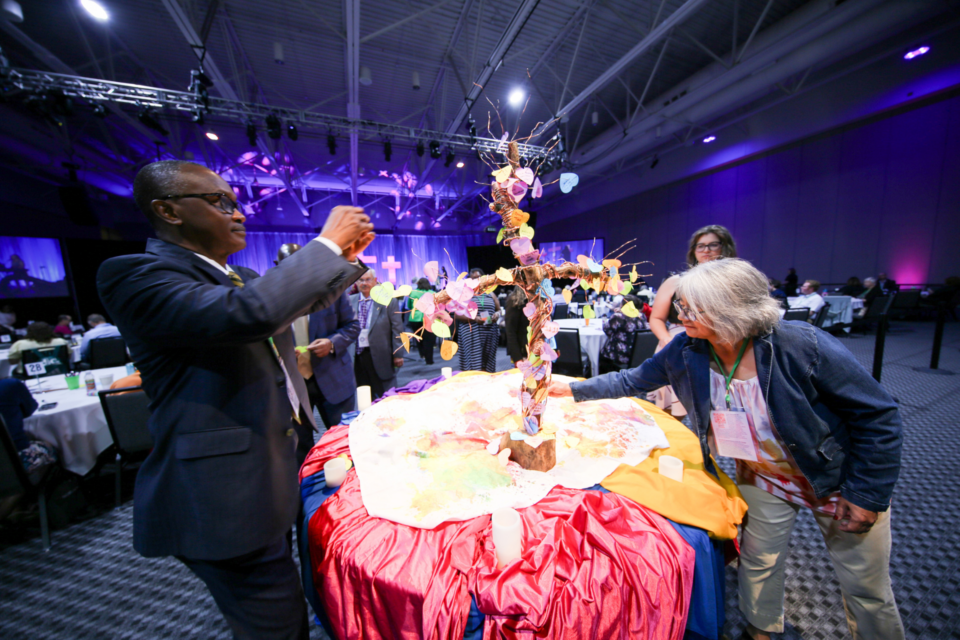
On Thursday morning, a special session (watch here) focused on what to do as United Methodists moving forward post-General Conference in a time of renewal. This was led by two guest speakers, Dr. Ashley Boggan D., General Secretary of the General Commission on Archives and History, and Rev. Dr. Paul Chilcote, an award-winning author, retired United Methodist minister, and theological educator. Both have studied the works of John and Charles Wesley extensively.
“How do we, as The United Methodist Church, kind of reverse ourselves a little bit, reform ourselves, or renew ourselves to reclaim the movement that is the core of who we are,” said Boggan. Dr. Boggan and Dr. Chilcote focused on this question: “What lessons can The United Methodist Church take from the church’s history moving forward?”
“A Rule of Life, like the General Rules, is at the heart of Wesley’s program on renewal in the life of the church,” said Chilcote. “A Rule of Life keeps us directed and focused. Otherwise, if you are here or there, you get scattered very quickly, and maybe even more importantly, you lose connection with the most important things.”
Chilcote said that, without question, John and Charles Wesley always focused their attention on love.
“We spend so much of our energy and time and probably our prayers on budget and financial stuff,” said Boggan. “How do we not let that be the driver of our conversations? How do we instead focus on who we will be and have faith that people will come along if we are defending a positive message of vision, unity, and love? People will catch on.”
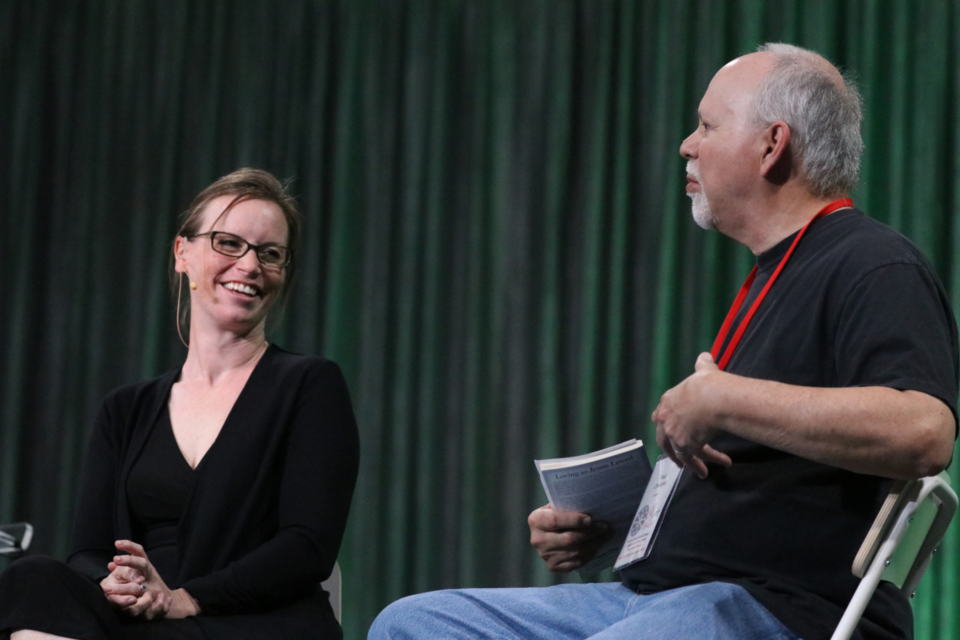
Bishop Julius Trimble, resident bishop of the Indiana Conference, said during a lunch conversation with BIPOC (black, indigenous, and other people of color) delegates on Wednesday that a positive message led by love that focuses on works of justice and compassion is very United Methodist, and we need to reclaim it.
Responding to the threat of white Christian nationalism rising in American society, he urged our churches to speak up, tell the truth, and return to our Methodist roots of radicalism, which many of the historic black churches in The United Methodist Church were built upon. They were strengthened by “making disciples of Jesus Christ and the transformation of society.” Bishop Trimble said one way to tap into these roots of radicalism is by taking hold of the Revised Social Principles, which were approved at General Conference.
Dr. Ashley Boggan D. gave a separate presentation (watch here) on Wednesday afternoon, arguing that United Methodists can seize the opportunity before us post-General Conference as many see the church poised for a rebirth. We can reclaim our heritage as “vile” Wesleyans (“vile” is a term John Wesley used). She claims the vile spirit that pushes Methodists to break social boundaries while embodying God’s love must be at work in The United Methodist Church today.
“We must be willing to do the unimaginable, to preach in new fields, and to create new communities in a disconnected world,” she said.
Takeaway #3: Recommit to diversity, equality, and inclusion at all levels of the church, for there is more work to be done.
Another focus of the 2024 NCJ Conference was conversations and legislation related to diversity, racial justice, and the inclusion of all persons in the life of the church, especially our LGBTQIA+ siblings. The conference theme, “Lift Every Voice,” reinforced this for attendees.
On Friday morning, NCJ delegates received the Racial Audit Report (watch here – begin at 2:23:47). Later that evening, they held a session to discuss two motions framed around this report (watch here – begin at 13:20).
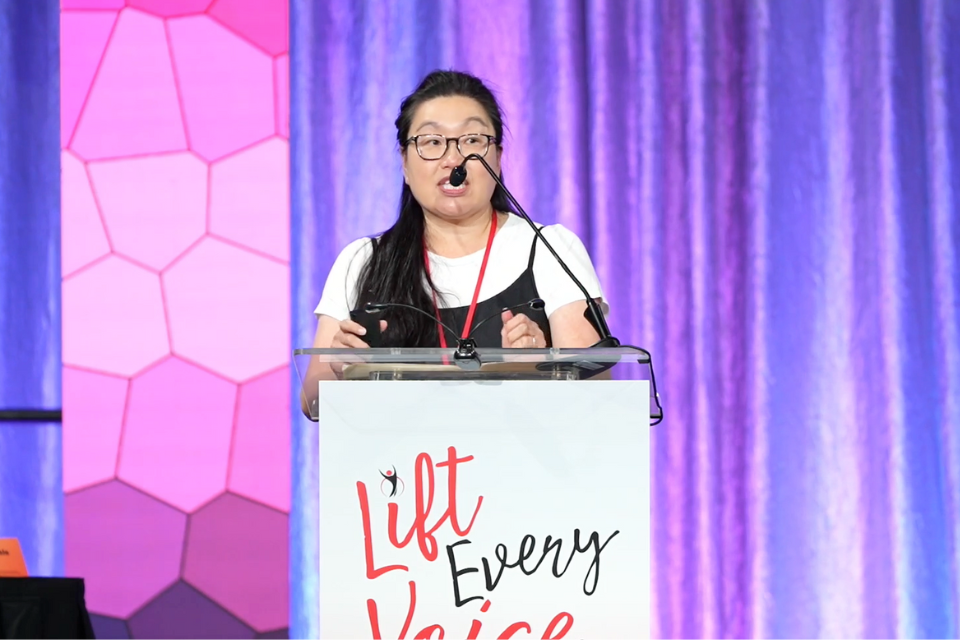
Legislation at the 2022 NCJ Conference mandated that each annual conference within the jurisdiction conduct a racial audit of finances and budget to see if they align with the vision and intent of the NCJ’s Covenant to Build BeLoved Community that passed in 2021. The General Commission on Religion and Race (GCORR) managed the audit, conducted in 2023, and provided data to the NCJ Mission Council, who delivered the report at this year’s NCJ Conference.
In the Michigan Conference, the Anti-Bias/Anti-Racism (ABAR) working group, which created the Anti-Bias/Anti-Racism Education & Training online curriculum, was responsible for reviewing the results of the racial audit conducted in Michigan.
Laura Witkowski, lay delegate from the Michigan Conference, says, “The Racial Audit Report was pretty sobering. It showed that our churches mostly do not look like our communities, and we have so much work to do in building the beloved community.”
In response to the report, NCJ delegates passed a resolution in Sioux Falls to add accountability to this work, requesting that data collection be ongoing and that annual conferences offer reports to the jurisdiction on how they are using the racial audit and then have time to discuss the reports received. “Data matters,” notes Witkowski, “and we need to use the data audit information in planning and improving current practices and policies.”
On Wednesday, members of the NCJ College of Bishops met with BIPOC delegates for a time of reflection and conversation over lunch. The topic centered on accessibility, belonging, inclusion, diversity, and equity and how these qualities are being lived out in the North Central Jurisdiction. This conversation was a follow-up to a resolution passed at the 2022 NCJ Conference encouraging the College of Bishops to meet at least once a year with BIPOC leaders to share spaces of hope and strategize for continued ways to build beloved community.
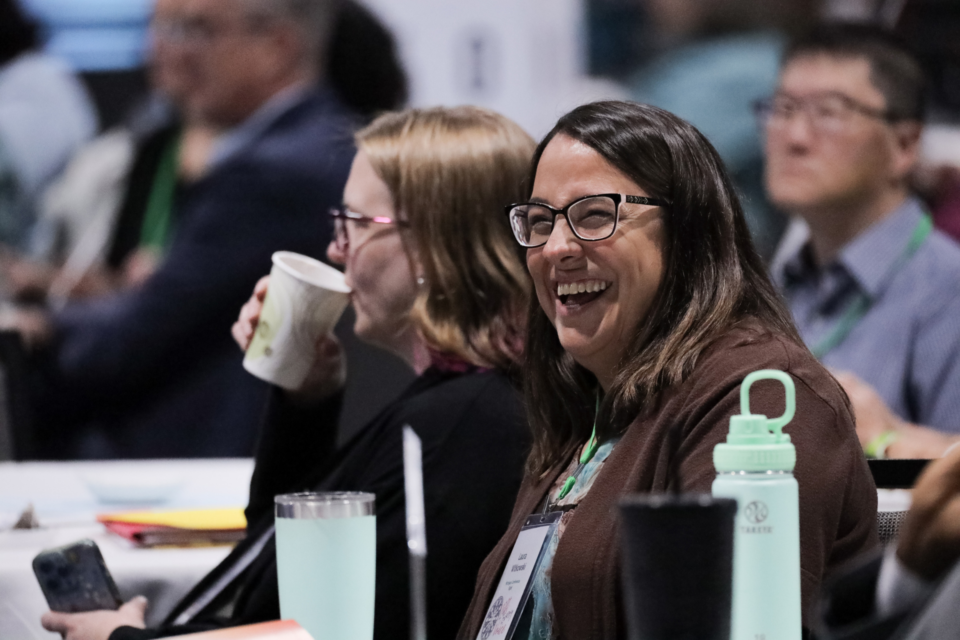
Delegates spoke of the better place The United Methodist Church finds itself in post-General Conference, especially in light of legislation related to regionalization and LGBTQIA+ inclusion. Some delegates are experiencing an attitude of innovation, experimentation, and excitement about what God can do now in the church. Reflecting on ways the church can improve, several delegates voiced their concerns about moving beyond words and promises to action.
On Thursday morning, the NCJ College of Bishops met with LGBTQIA+ delegates for breakfast to reflect on inclusion within the jurisdiction. Many said they felt relief when this year’s General Conference rescinded the harmful language related to LGBTQIA+ people. “It gave me hope,” one delegate said. “It took us 52 years to change this [restrictive language]. But it happened. Change is possible.”
Along with the celebratory words were reminders that the work of fully including — and welcoming — people who identify as LGBTQIA+ was only the beginning. “Just because we have changed the rules does not mean the harm has gone away,” one delegate noted.
The church has much work to do in apologizing for both the overt dehumanization of LGBTQIA+ people as well as the complicit silence, attendees noted. Next steps can include developing practices that demonstrate welcome and inclusion. And listening, one of the bishops added. “May we work on ways to repair our relationships with our harmed LGBTQIA+ members. May we listen to their stories with love and humility.”
Editor’s note: Portions of this article were used and adapted from a news release published by the North Central Jurisdiction and articles written by Liz Winders, director of communications for the Iowa Conference, Karla Hovde, communications specialist for the Minnesota Conference, and Victoria Rebeck, director of communications for the Northern Illinois Conference.
Last Updated on July 31, 2024

